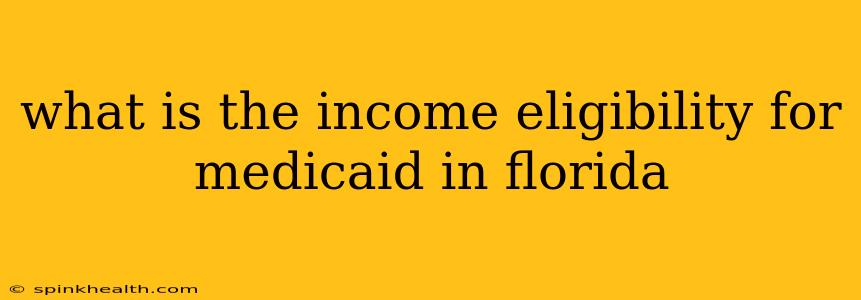Navigating the Maze: Understanding Medicaid Income Eligibility in Florida
The shimmering Florida sun and warm beaches attract many, but the reality of healthcare costs can be a harsh wake-up call. Medicaid, a crucial lifeline for many, offers healthcare coverage to low-income individuals and families. However, understanding Florida's Medicaid income eligibility isn't always straightforward. It's a journey through a landscape of varying factors and specific criteria, and this guide will illuminate the path.
My name is Alex, and I've spent years helping individuals navigate the complexities of Florida's healthcare system. This isn't just a data dump; it's a story of understanding, a guide to empower you to find your way through the system.
Let's begin unraveling the mystery of Florida Medicaid income eligibility. It's not a single number; it's a nuanced calculation dependent on several key elements.
What is the basic income limit for Medicaid in Florida?
There isn't one single income limit for Medicaid in Florida. The eligibility requirements vary depending on several factors, including:
- Your family size: A family of four will have a different income limit than a single individual. The larger your family, the higher the income limit generally is. The state uses Federal Poverty Level (FPL) guidelines to determine these limits, which are adjusted annually.
- Your age: Eligibility rules often differ based on age, particularly for children, pregnant women, seniors, and people with disabilities. Children, for instance, often have more generous eligibility thresholds.
- Your disability status: Individuals with disabilities might qualify for Medicaid even if their income exceeds the standard limits for other groups. This is because Medicaid offers specialized programs for individuals with specific needs.
- Your citizenship status: Your immigration status can influence your eligibility. Certain immigrant groups may have restricted access to Medicaid.
How is my income calculated for Medicaid eligibility?
Florida uses your modified adjusted gross income (MAGI) to determine your eligibility. This is similar to your adjusted gross income (AGI) from your tax return, but with some adjustments made by the state. This calculation often includes income from wages, salaries, self-employment, investments, and other sources. It's crucial to accurately report all income sources.
What resources are considered when determining Medicaid eligibility?
Beyond income, the state also considers your resources, or assets. These include cash, savings accounts, stocks, bonds, and other valuable possessions. There are resource limits, although these limits are generally higher than income limits. This means that even if your income is below the threshold, having excessive resources might disqualify you.
Are there different Medicaid programs in Florida?
Yes. Florida offers several Medicaid programs, each with its own specific eligibility requirements:
- Medicaid for children: This covers children under age 19 in families who meet specific income and resource limits.
- Medicaid for pregnant women: This provides healthcare coverage during pregnancy and a limited period after delivery.
- Medicaid for seniors and people with disabilities: This is a more complex program, often relying on both income and resource thresholds and specific medical need evaluations.
Where can I find the most up-to-date information about Florida Medicaid income limits?
The most reliable source for current income eligibility information is the official website of the Agency for Health Care Administration (AHCA) in Florida. Their website contains detailed eligibility guidelines, program descriptions, and contact information for assistance. Always check the official website for the most current and accurate details as these guidelines are subject to change.
What if my income is slightly above the limit?
Don't give up hope. Even if your income is just above the limit, there might be other options available, such as:
- CHIP (Children’s Health Insurance Program): This program may cover children in families who earn too much to qualify for Medicaid but still need affordable healthcare.
- Subsidized healthcare plans through the Affordable Care Act (ACA): The ACA marketplace offers various plans with subsidies that can make healthcare more affordable.
Remember, navigating the Medicaid system can be complex. Don't hesitate to reach out to AHCA for guidance, or consult with a healthcare advocate or navigator who can assist you in the application process and ensure you receive the coverage you deserve. Your health journey should be supported, not complicated.

